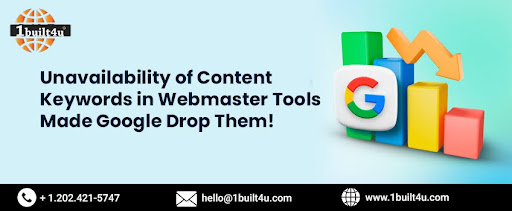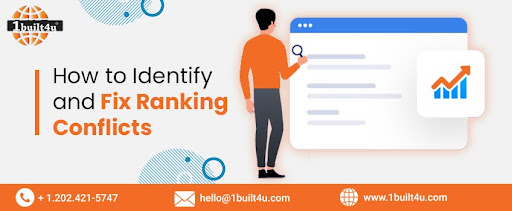
Unavailability of Content Keywords in Webmaster Tools Made Google Drop Them!
Almost every month, Google releases new updates, but how these changes help SEO services is a question for all webmasters. In the past, Google Webmaster rebranded as Search Console without providing a specific justification. This did not affect execution or any significant changes in Search Control center links. However, Google started this by introducing numerous changes one at a time. Our best SEO company in Ashburn VA has noted down below such a change made by Google - a big one!
Understanding Content Keywords and Its Importance
Content Keywords in Google Webmaster Tools was a feature that provided insights into the most common keywords found by Googlebot while crawling a specific website. Webmasters could view a list of keywords and their associated significance, helping them understand how Google perceived the content on their site. This information was valuable for optimizing content, ensuring alignment with target keywords, and improving overall search engine visibility.
The unavailability of content keywords in Google's Webmaster Tools has ushered in a new era for SEO professionals. While it presents challenges, it also prompts a reevaluation of strategies, emphasizing the importance of user-centric content, comprehensive SEO tools, and a proactive approach to staying abreast of algorithmic changes. By embracing the given principles, webmasters can navigate the consequences and continue to optimize their websites for success in the dynamic digital ecosystem.
Google Webmaster
Google Webmaster or Search Console recently removed the content keyword feature, which was extremely helpful for optimizing content over web pages. Because this was a very important feature for webmasters, they were shocked by this news. With the help of content keywords, webmasters can determine the significance of keywords within the content and determine new keyword scope.
Google had previously removed such useful features from its webmaster tool. Prior to this, Google discontinued the SiteLink demotion feature, which, when Online Reputation Management or ORM was being carried out, was also beneficial to webmasters. With the help of this feature, a webmaster could remove any unneeded page from the Google SERPs.
It is necessary to hire any online marketing experts who are able to identify the most recent changes in the online medium and take effective steps to implement for better SEO position since Google removed all beneficial tool access for perfect SEO. If you need professional help, our experts are available for consultation; depending on your convenience before selecting a digital marketing service.
Google’s Actions
Google has removed Content Keyword Report, one of the webmaster tool's earliest features. The only way to determine what Google discovered while crawling our website was through the content keywords - says the Google update for SEO Content Keyword Report. It was extremely valuable at an early time for any SEO agency, SEO experts and website admins since it shows whether Google can creep our webpage or whether our web page is hacked.
According to Google, we now have sufficient additional features in the search console to comprehend what Google crawls on our website, similar to Google's Search Analytics and Fetch. Additionally, Google informs us of any hacking activity on our website. The search engine organization claims that keyword listing in the Content Keyword Report was frequently misunderstood by users. Google therefore removed those features for these reasons. The internet giant also advises that all individuals shall be clear about the subject matter of their website and the keywords they want to be found for.
Impact on SEO Audits and Troubleshooting
SEO audits often involve a thorough examination of Content Keywords to identify potential issues with a website's content. The feature served as a diagnostic tool, highlighting areas where the site might be lacking or excelling in terms of keyword relevance. Its removal has made the SEO audit process more challenging, requiring webmasters to adopt alternative methods to identify and address content-related issues.
Webmasters must now utilize other features within Google Search Console and external SEO audit tools to troubleshoot and enhance their website's performance. This shift in approach necessitates a more comprehensive understanding of various SEO factors and a reliance on multiple tools for a holistic analysis.
Limited Insights into Google's Understanding
Content Keywords provided a unique glimpse into how Google's algorithm perceived a website's content. The feature displayed the most prominent keywords detected during the crawling process, offering valuable insights into the search engine's interpretation of a site's topical relevance. With its removal, webmasters now face a challenge in understanding how Google categorizes and prioritizes keywords on their site.
This lack of insight into Google's understanding of content may lead to a more trial-and-error approach in optimizing for search engines. Webmasters may need to rely on broader SEO principles and stay updated on Google's guidelines and algorithm changes to adapt their strategies effectively.
Loss of Keyword Insight
The discontinuation of Content Keywords means that webmasters no longer have direct access to a list of keywords that Google associates with their website. This loss of insight has left many SEO professionals without a crucial tool for understanding how search engines interpret their site's content. Without this information, optimizing content for relevant keywords becomes a more challenging task.
To mitigate this consequence, webmasters must now turn to other tools and analytics to gather keyword data, relying on third-party platforms and methods that might not offer the same level of detail as the original Content Keywords feature.
Navigating the Changes
In light of the consequences outlined, it's crucial for webmasters and marketers to proactively navigate the evolving SEO landscape. Here are some strategies to mitigate the impact of the unavailability of content keywords:
- Focus on User Intent: Embrace a user-centric approach by creating content that aligns with user intent. Understand the needs and interests of your target audience, and develop content that provides genuine value.
- Leverage Comprehensive SEO Tools: Explore and invest in comprehensive SEO tools that offer a broad range of metrics and insights. These tools can compensate for the loss of content keywords by providing in-depth analysis of organic search performance, keyword rankings, and competitor strategies.
- Diversify Keyword Research: Diversify keyword research strategies by exploring alternative methods. Utilize tools that analyze competitor keywords, monitor trending topics, and offer insights into the language your audience uses.
- Prioritize Quality Content: Place a strong emphasis on creating high-quality, relevant content. Google's algorithms increasingly prioritize content that answers user queries comprehensively and offers valuable insights.
- Stay Informed About Algorithm Changes: Regularly stay informed about updates to search engine algorithms. This knowledge empowers webmasters to adapt their strategies to align with evolving priorities and ensures they remain competitive in the ever-changing SEO landscape.
Conclusion
In conclusion, your SEO company must join Google Webmaster Tools and make the most of it with or without the Content Keyword feature. It is excellent because it compares paid and natural results and lets you see how well ads perform in terms of CTR when they are present or not. The good news is that you do not need a Google AdWords account, and the organic search query data appears to be more accurate than the Webmaster Tools data, which is rounded to the nearest hundred. The bad news is that it is not included in Google Analytics, though it is possible that it will one day. For more information or to avail services of our search engine optimization services in Ashburn USA, visit 1built4u.com.





